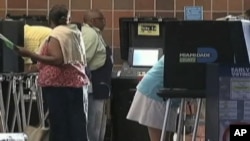The rise of the Tea Party movement is injecting uncertainty in many US congressional races. Normally, most races pit only two candidates against each other, Republican versus Democrat. In Florida, voters are choosing between three major candidates for the US Senate: a Tea Party-backed Republican, a former Republican and a Democrat.
Early voting is underway in Florida, giving voters plenty of time to think about and cast their ballots. In the race for a US Senate seat, instead of the typical two-way contest between a Democrat and a Republican, voters have three main candidates to choose from.
VOTER ONE: "I've always thought more parties are better because you can have more people involved and more people having discourse about the issues."
VOTER TWO: "It's very confusing. It puts you in a position where you don't know who to vote for."
The race is potentially confusing. The three main candidates are Republican Marco Rubio, Democrat Kendrick Meek, and Governor Charlie Crist, who was elected as a Republican before he became an independent.
Christopher Mann is a political scientist at the University of Miami. He says Florida is not used to this kind of race.
"What's really remarkable about this three-way race is that it is not an outsider," noted Mann. "It's a main player and the second place contender in the polls. The incumbent governor is the third-party guy."
Tea Party activists helped state legislator Marco Rubio capture the Republican nomination over Governor Crist.
Crist says Republican voters should be able to see that Rubio is wrong for the party and the country because he'll be a polarizing figure.
"If Marco Rubio goes to Washington, we're going to get six more years of gridlock and finger-pointing and arguing," said Crist.
At a recent debate, Rubio accused the governor of straddling both parties.
"He changes position on the issues because he wants to win the election," stated Rubio.
Across the country, Tea Party candidates are having an impact. Some are competing as third-party candidates. Others have seized the Republican nomination away from traditional party favorites, like Crist.
Many key Republicans, like former New York Mayor Rudy Giuliani, are standing behind Rubio.
Crist, a Republican until recently, is winning support from some key Democrats including Robert F. Kennedy Junior, whose uncle was President John F. Kennedy.
"It's unusual and a little bit of a painful thing to do to come to Florida and endorse somebody who is not a member of the Democratic party but who I believe is the best candidate for the job and the only one who can win," said Kennedy.
Democratic activists in Palm Beach County north of Miami, reject Crist. Party leaders say they stand behind their candidate, Democratic Congressman Meek. They want Crist to drop out of the race.
"You have no idea what he's going to do when he gets to Washington, and as a result he is obscuring the real choices that are before the people," said Mark Alan Siegel who chairs Palm Beach County's Democratic Party.
The latest polls show Rubio leading the field. But experts say he would lose if he was competing against only Meek or Crist.
Christopher Mann says, in the end, Rubio could win without a majority of the votes or a clear mandate.
"It means he is a vulnerable politician," added Mann. "He has six years to try to get a majority status. It doesn't mean he is an overwhelming leader, it means a majority of voters voted against him."
By November 2, Florida voters will have to sort out a confusing situation and decide who will win the Senate seat.




